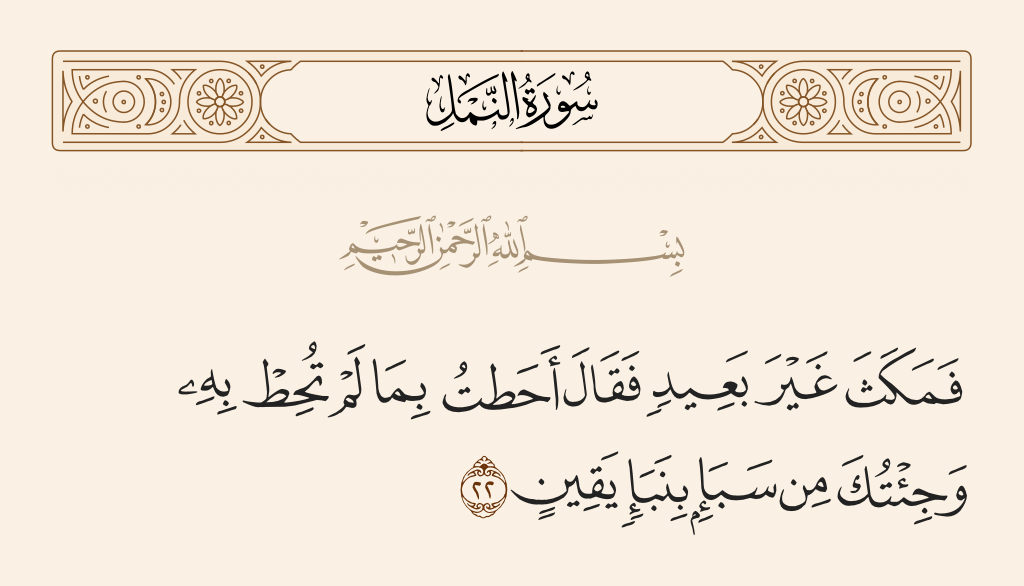Surat An-Naml Verse No. 22: Reading and listening
Translation of the verse 22 from Surah An-Naml : Number of verses 93 - - page 378 - Part 19.

﴾فَمَكَثَ غَيۡرَ بَعِيدٖ فَقَالَ أَحَطتُ بِمَا لَمۡ تُحِطۡ بِهِۦ وَجِئۡتُكَ مِن سَبَإِۭ بِنَبَإٖ يَقِينٍ ﴿
[ النمل: 22]
But the hoopoe stayed not long, he (came up and) said: "I have grasped (the knowledge of a thing) which you have not grasped and I have come to you from Saba' (Sheba) with true news.
English - Sahih International
But the hoopoe stayed not long and said, "I have encompassed [in knowledge] that which you have not encompassed, and I have come to you from Sheba with certain news.
Tafheem-ul-Quran by Syed Abu-al-A'la Maududi
(27:22) The bird did not take long when it came and said, "I have obtained knowledge of things of which you have no knowledge. I have brought sure information about Saba. *29
Tafheem-ul-Quran by Syed Abu-al-A'la Maududi
*29) Saba' were a well-known commercial people of southern Arabia, whose capital city of Ma'rib lay about 55 miles to the north-east of San`a', the present capital of Yaman. They rose to power after the decline of the Minaean Kingdom in about 1100 B.C. and flourished for a thousand years in Arabia. Then in 115 B.C. they were replaced by the Himyarites, the other well-known people of southern Arabia, who ruled Yaman and Hadramaut in Arabia and Habash in Africa. The Sabaeans controlled the whole trade that passed between eastern Africa, India, the Far East and Arabia itself, on the one hand, and Egypt, Syria, Greece and Rome on the other. That is why they were famous for their wealth in the ancient times; so much so that according to the Greek historians they were the richest people of the world. Besides trade and commerce, another great reason for their prosperity was that they had built dams here and there in their country to store rainwater for irrigation purposes, which had turned their whole land into a veritable garden. The Greek; historians have made mention of the unusual greenery of their country; and the Qur'an also refers to it in Surah Saba': 15.The statement of the hud-hud, `I have obtained knowledge of things of which you have no knowledge", does not imply that the Prophet Solomon was wholly unaware of Saba'. Obviously, the ruler of Syria and Palestine whose kingdom extended to the northern shores of the Red Sea (Gulf of `Aqabah), could not be unaware of a people who ruled the southern shores (Yaman) of the same Red Sea, and who also controlled an important pan of the international trade. Moreover, according to Psalms, Solomon's father, Prophet David, knew Saba' We lied the following words of his prayer in Psalms "Give the king thy judgement, O God, and thy righteousness unto the king's son (i.e. Solomon)... The kings of Tarshish and of the isles shall bring presents: the kings of Sheba and Seba (i.e. of Yaman's and Habash's branches) shall offer gifts." (72: 1-2, 10-11). Therefore, what the hud-hud means to say is this: "The knowledge of the things 1 have seen with my eyes in the central city of the Sabaeans. has not yet reached you."